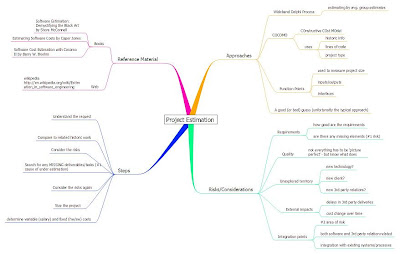Tuesday, September 30, 2008
Cuckoo's Egg - by Cliff Stoll
About 10 years ago a saw a special on PBS about Cliff Stoll and how he traced an international hacker after finding a 75cent discrepancy in the Lawrence Berkley computer systems - just an amazing story. This is a true geek/hacker book for those technically inclined (even though there is little technology discussed). Highly recommended enjoyable read - recharges the batteries.
Sunday, September 28, 2008
I agreee with Larry
 Here's Larry's take on cloud computing....
Here's Larry's take on cloud computing....http://news.cnet.com/8301-13953_3-10052188-80.html..
basically BS, but willing to join if it makes him some more $ (I guess he needs another sail boat). I think I said something similar (without the need to use the BS for more $): http://itprojectguide.blogspot.com/2008/08/something-new-something-old-something.html.
I think as long as leading IT (yes Larry is still up there I guess) promote sales-speech there will always be some BS line leading to some existing technology being sold instead of effort being spent on new ideas. I'd like to call it what it is...but who am I to recommend anything, I'm considering myself the first cloud-centric blog-a-matic project manager. Keep the tasks, risks and plans all in the cloud...I also have a Brooklyn Cloud Bridge to sell if anyone is interested.
Wednesday, September 24, 2008
Sunday, September 21, 2008
XP - my take

I recently read a post by Kent Beck in the ExtremeProgramming Yahoo group - http://tech.groups.yahoo.com/group/extremeprogramming/message/145397 (you'll probably need to join to read the entire post - which I recommend). My take on it is that - like all other revolutions (this one being one of process from traditional SDLC to Agile/XP) - the new becomes the norm and the norm become bureaucratic - making further drastic changes required. I've always seen Agile and XP initiatives as an attempt to deliver greater value by removing the imposed management overhead and miss-steps (such as thinking mediocre can replace exceptional with the right process in place) - and, unfortunately now that many Agile/XP practices/processes have become the norm, they are now the anchor....just my opinion.
Responsible Development is the style of development I aspire to now. It can be summarized by answering the question, "How would I develop if it was my money?" I'm amazed how many theoretical arguments evaporate when faced with this question. Responsible Development shares many practices with XP but the roots are different. Responsible Development's values are honesty, transparency, accountability, and responsibility. These lead me to pairing, test-first, incremental design, continuous integration, and so on because they support the values. - Kent Beck
Wednesday, September 17, 2008
FLOSS - another podcast from twit.tv
This podcast along with Security Now is worth the cost of 5 iPods and provides more info then any techie can consume weekly. HIGHLY RECOMMENDED!
Monday, September 15, 2008
A truly interesting story
What the real truth is....who knows: http://www.itworld.com/print/53936
Everyone in IT knows of an admin that has had some 'personal' connection to the network - something that is often fostered and looked on as positive, but what if it gets out of hand? Or what if the admin REALLY does have the network's best interest in mind and the higher-ups are really impacting security going through CYA motions? Should there be a 'special' agreement between those in charge and those overlooking the network? Someway to put vital info in escrow to ensure the network is transferable? Some hot-button the admin can hit when higher-ups are indeed endangering the network? Thank goodness most IT people have high integrity and are mostly focused on solving issues otherwise the lack of mutual trust and transparency would surely impact every company every time an admin moves on (or is moved on).
Everyone in IT knows of an admin that has had some 'personal' connection to the network - something that is often fostered and looked on as positive, but what if it gets out of hand? Or what if the admin REALLY does have the network's best interest in mind and the higher-ups are really impacting security going through CYA motions? Should there be a 'special' agreement between those in charge and those overlooking the network? Someway to put vital info in escrow to ensure the network is transferable? Some hot-button the admin can hit when higher-ups are indeed endangering the network? Thank goodness most IT people have high integrity and are mostly focused on solving issues otherwise the lack of mutual trust and transparency would surely impact every company every time an admin moves on (or is moved on).
Talk about Risk!
http://www.nytimes.com/2008/09/15/business/15street.html?_r=1&oref=slogin
WOW! Imagine having a project within any financial company at this point...how do you mitigate a risk of this magnitude? Makes the late delivery of a document seem meaningless - right? Not really. Projects will be canceled, initiatives put on hold - but that's mid/long term, from my experience most in-progress projects will remain in-progress - the real risk is team morale....
http://valleywag.com/5049763/lehman-brothers-it-guys-still-have-to-work-monday
WOW! Imagine having a project within any financial company at this point...how do you mitigate a risk of this magnitude? Makes the late delivery of a document seem meaningless - right? Not really. Projects will be canceled, initiatives put on hold - but that's mid/long term, from my experience most in-progress projects will remain in-progress - the real risk is team morale....
http://valleywag.com/5049763/lehman-brothers-it-guys-still-have-to-work-monday
Thursday, September 11, 2008
Project Management via Google Sites?
Does it make sense for project managers to use something like Google Sites (Ex: http://sites.google.com/site/pmtestmeade/) to manage projects? Instead of MS Project (anything is better then MS Project) or other desktop and/or web based project tools? What is Google Sites - Google Sites is an online application that makes creating a team web site as easy as editing a document.(http://sites.google.com/support/bin/answer.py?answer=90447) For the most part it's a wiki like environment that includes gadgets like calendering, word/spreadsheet docs, photos, etc.....some benefits over PM specific systems:
- it's free (always take free with a grain of salt, if it doesn't work it could cost you a lot)
- easy, group updateable (but not pretty)
- lots of neat gadgets
- does not have PM specific functionality, like task management (which might be a good thing, use the calendar or spreadsheet)
- it's not fully under your control - what if the site is down or they go out of business (Google? - I'm assuming all other PM companies will be out of business prior to Google)
Next steps?:
- select a low risk project
- play around with Google sites (learn how the thing works)
- setup the basics like a home page, calendar and the file cabinet (for your docs)
- invite others
- see if the effort/cost + confusion + frustration > benefit
Wednesday, September 10, 2008
Know thy problem
http://www.techcrunch.com/2008/09/10/tc50-devunity-offers-browser-based-collaborative-coding/
Interesting idea, good panel questions (especially Tim O'Reilly - of course) - but what is the problem being solved? Widgets, gidgets and gadgets are all nice, but unless there's an issue being addressed and the solution is effective - it's merely an oddity or a short-term point of interest.
Friday, September 5, 2008
IT Project Guide - RM - open source project management tool

IT Project Guide - Risk Management - beta version is now available for demo and download:
demo: http://itprojectguide.org/PMBase/risk/home
download: https://sourceforge.net/projects/itpgrm/
This, web based, project management tool was inspired by IT Project Guide - PM, a branch of dotProject and web2Project.
Wednesday, September 3, 2008
Chrome is HERE!

http://www.google.com/chrome
It's fast, clean, fast...and did I say fast? No issues installing, site rendering seems to be sharper, some issues with some tree-views....but it could be related to bad html coding (mine)...overall first impression...VERY VERY NICE (and fast).
Tuesday, September 2, 2008
shifting sands
Once again change is coming...Google Chrome:http://googleblog.blogspot.com/2008/09/fresh-take-on-browser.html
Gee dad, in your days they had something called a desktop operating system..??WOW!
Anyone have this in their risk list?
Gee dad, in your days they had something called a desktop operating system..??WOW!
Anyone have this in their risk list?
Monday, September 1, 2008
Don't let email get in your way
 When you have the need to communicate, do you feel email is easier? easier then text messaging? which is easier then phoning? which is easier then face-to-face? Why is that? Easy - it's less personal and less likely to require real thinking. An email is like a fire-and-forget type of communication, we know there's no one present to prohibit us from completing our entire thought (often short and one sided), no head shaking (in a negative way), no energy spent on personal relations ('how is your family?') and the most important aspect- we can ignore any feedback for some time (gee-sent the email and went to lunch, yep 9:30am a bit early, but I was working all night so I was hungry).
When you have the need to communicate, do you feel email is easier? easier then text messaging? which is easier then phoning? which is easier then face-to-face? Why is that? Easy - it's less personal and less likely to require real thinking. An email is like a fire-and-forget type of communication, we know there's no one present to prohibit us from completing our entire thought (often short and one sided), no head shaking (in a negative way), no energy spent on personal relations ('how is your family?') and the most important aspect- we can ignore any feedback for some time (gee-sent the email and went to lunch, yep 9:30am a bit early, but I was working all night so I was hungry).The overuse of email is a sure-sign of a project ready to fail or failing due to poor communication. Good communication starts with good relationship building - see the person, hear the person, know the person...if there is no way to 'get close' in a physical sense, make extra efforts with voice communication - make a video - STAY AWAY FROM EMAIL FOR COMMUNICATION. Just like any other endeavor - often you need to do the opposite of what you want to get the results:
- face-to-face
- phone
- text-messaging
(image via: /www.buycostumes.com)
Subscribe to:
Comments (Atom)


